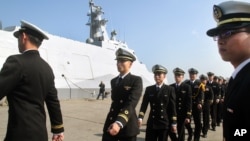Taiwan will extend compulsory military service to one year from four months from 2024 due to the rising threat the democratically governed island faces from its giant neighbor China, President Tsai Ing-wen said on Tuesday.
The move, which had been well-flagged, comes as China ramps up military, diplomatic and economic pressure on Taiwan to assert its sovereignty claims, including almost daily Chinese air force missions near the island over the past three years.
Tsai said Taiwan wanted peace but needed to be able to defend itself.
"As long as Taiwan is strong enough, it will be the home of democracy and freedom all over the world, and it will not become a battlefield," Tsai told a news conference announcing the decision to extend the conscription period, which she described as "incredibly difficult."
The current military system, including training reservists, is inefficient and insufficient to cope with China's rising military threat, especially if it launched a rapid attack on the island, Tsai added.
"Taiwan wants to tell the world that between democracy and dictatorship, we firmly believe in democracy. Between war and peace, we insist on peace. Let us show the courage and determination to protect our homeland and defend democracy."
Conscripts will undergo more intense training, including shooting exercises, combat instruction used by U.S. forces, and operating more powerful weapons including Stinger anti-aircraft missiles and anti-tank missiles, Tsai said.
Taiwan has complained of delayed U.S. arms deliveries this year, including of Stingers, but Tsai said the situation was improving after discussions with the United States.
The de facto U.S. embassy in Taiwan welcomed the announcement on conscription reform.
"The United States' commitment to Taiwan and steps Taiwan takes to enhance its self-defense capabilities contribute to the maintenance of peace and stability across the Taiwan Strait and within the region," the American Institute in Taiwan said.
Tsai's security team, including high-level officials from the defense ministry and the National Security Council, have been reviewing Taiwan's military system since 2020, an official briefed on the matter told Reuters.
Taipei, which rejects Beijing's sovereignty claims to Taiwan, on Monday reported the largest-ever Chinese air force incursion into the island's air defense identification zone, with 43 Chinese planes crossing an unofficial buffer between the two sides.
China also staged war games near Taiwan in August following a visit to Taipei by U.S. House Speaker Nancy Pelosi.
China a 'major concern'
Taiwan's government says only the Taiwanese people can decide their future.
"China's various unilateral behaviors have become a major concern for regional security," said the official, who took part in the high-level security discussion.
Conscripts would be tasked with guarding key infrastructure, enabling regular forces to respond more swiftly in the event of any attempt by China to invade, the defense ministry said at the same press conference.
Chieh Chung, researcher at the National Policy Foundation, a Taipei-based think tank, estimated that the extension could add an extra 60,000 to 70,000 manpower annually to the current 165,000-strong professional force in 2027 and beyond.
Even after the extension, however, the period of service will still be shorter than the 18 months mandated in South Korea, which faces a hostile and nuclear-armed North Korea.
Tsai is overseeing a broad modernization program, championing the idea of "asymmetric warfare" to make the island's forces more mobile, agile and harder to attack.
While the United States has pressed Taiwan to modernize its military to make it like a "porcupine" - agile and hard to attack - Tsai said there had been no pressure from Washington for these reforms.
China's growing assertiveness towards the island it claims as its own, as well as the war in Ukraine have prompted debate within Taiwan about how to boost defense.
Tsai said "a few things" had been learned from that war which have been incorporated into Taiwan's defense reforms and noted that Ukraine's ability to hold off much larger Russian forces had given the international community time to render assistance.








